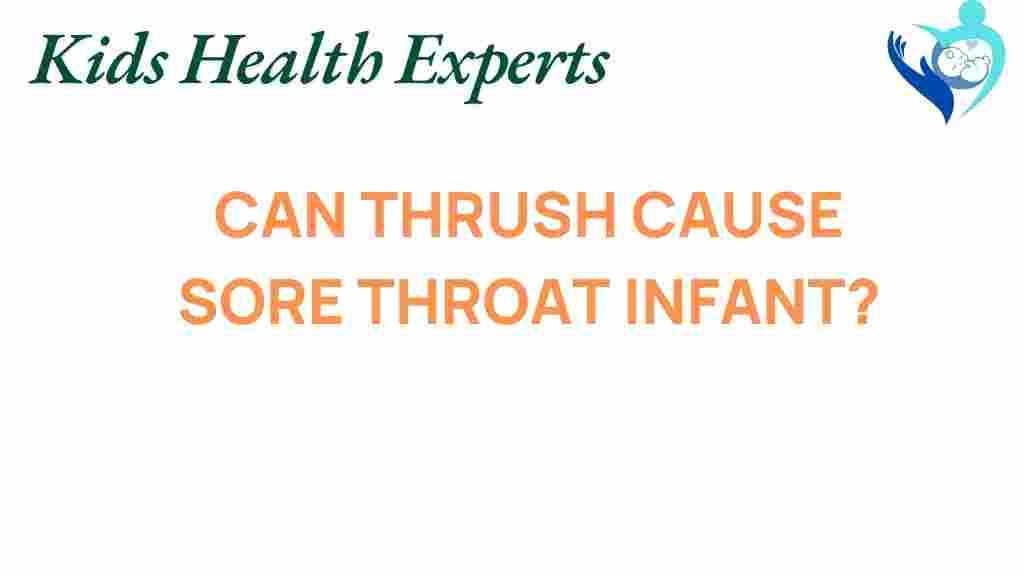Unraveling the Connection: Can Thrush Lead to Infant Sore Throat?
As parents, we often find ourselves in a constant quest for answers about our children’s health. One of the conditions that can cause concern is thrush, an oral yeast infection that can affect infants. When an infant presents with a sore throat, many parents wonder if there is a connection between these two health issues. In this comprehensive guide, we’ll explore the relationship between thrush and infant sore throat, including the symptoms, diagnosis, and treatment options available. Understanding these connections can empower parents to seek appropriate care and ensure their child’s health.
Understanding Thrush in Infants
Thrush, also known as oral candidiasis, is a common fungal infection caused by an overgrowth of the Candida yeast. This condition is particularly frequent in infants due to their developing immune system. The mouth is a warm, moist environment that can promote the growth of yeast, especially when the balance of bacteria and fungi is disrupted.
Symptoms of Thrush
Identifying thrush in infants can be challenging, but there are several symptoms to watch for:
- White patches on the tongue, gums, or inner cheeks
- Red, inflamed areas in the mouth
- Fussiness or irritability during feeding
- Difficulty swallowing
- Cracked skin at the corners of the mouth
These symptoms can often overlap with those of other conditions, making accurate diagnosis essential.
Can Thrush Cause an Infant Sore Throat?
The connection between thrush and infant sore throat is not immediately clear. However, there are several ways in which an oral yeast infection might lead to throat discomfort:
- Inflammation: The presence of thrush can lead to inflammation in the mouth and throat, causing pain.
- Difficulty Swallowing: Infants with thrush may refuse to eat or cry during feeding, which can lead to dehydration and further throat irritation.
- Secondary Infections: A compromised oral environment can make infants more susceptible to other infections, including bacterial infections that can cause a sore throat.
Symptoms of Infant Sore Throat
Recognizing the symptoms of an infant sore throat can help in addressing the issue promptly:
- Excessive fussiness or crying
- Refusal to eat or drink
- Drooling more than usual
- Difficulty swallowing
- Fever
Parents should be vigilant as these symptoms can signify various underlying conditions.
Diagnosis of Thrush and Sore Throat
Diagnosing thrush and an infant sore throat typically involves a thorough examination by a pediatrician. The doctor will look for:
- Visual signs of thrush in the mouth
- Presence of redness or swelling in the throat
- Medical history and feeding patterns
In some cases, the pediatrician may perform a swab of the affected area to confirm the presence of Candida yeast.
Treatment Options for Thrush and Sore Throat
Treating thrush and associated symptoms is crucial for the well-being of the infant. Here are some common treatment methods:
Treatment for Thrush
- Antifungal Medications: The most common treatment for thrush is an antifungal medication, typically in the form of a liquid that can be applied directly to the affected areas.
- Good Oral Hygiene: Maintaining cleanliness in the mouth can help prevent the overgrowth of yeast. Parents should regularly clean their infant’s mouth and any nursing equipment.
- Consulting a Pediatrician: If thrush persists or recurs, it’s essential to consult a physician for further evaluation.
Treatment for Infant Sore Throat
- Pain Relief: For discomfort, a pediatrician may recommend acetaminophen or ibuprofen, depending on the infant’s age and weight.
- Hydration: Keeping the infant well-hydrated is critical. Offer fluids regularly to prevent dehydration.
- Monitoring Symptoms: Parents should keep a close eye on symptoms and seek medical attention if they worsen or do not improve.
Breastfeeding and Thrush
Breastfeeding can play a significant role in a baby’s health, including their immune system development. However, breastfeeding mothers should also be cautious, as thrush can be passed from the baby to the mother’s nipples, leading to painful conditions. Here are some tips:
- Consult a Lactation Consultant: If you suspect thrush, consult a lactation specialist for guidance on proper breastfeeding techniques.
- Keep Nipples Dry: After breastfeeding, ensure that your nipples are dry to prevent yeast growth.
- Treat Both Mother and Baby: If thrush is diagnosed, both the mother and infant may need treatment to effectively eliminate the infection.
Troubleshooting Tips for Parents
Managing thrush and sore throat in infants can be daunting. Here are some troubleshooting tips:
- Stay Informed: Educate yourself about symptoms and treatment options to feel more confident in managing your child’s health.
- Maintain Open Communication: Keep in touch with your pediatrician and report any changes in your infant’s condition.
- Observe Feeding Patterns: Monitor how your baby feeds and any signs of discomfort during feeding.
For more information on pediatric health, consider visiting this resource.
Conclusion
Understanding the potential connection between thrush and infant sore throat is crucial for parents seeking to provide the best care for their children. By recognizing the symptoms, seeking appropriate diagnosis and treatment, and maintaining open communication with healthcare providers, parents can effectively manage these conditions. If you suspect your infant is suffering from thrush or a sore throat, do not hesitate to consult a pediatrician for guidance tailored to your child’s needs. Your child’s health and comfort are paramount, and timely intervention can make all the difference.
For further reading on oral yeast infections and their implications for infants, you can check out this article.
This article is in the category Conditions and created by KidsHealthExperts Team
